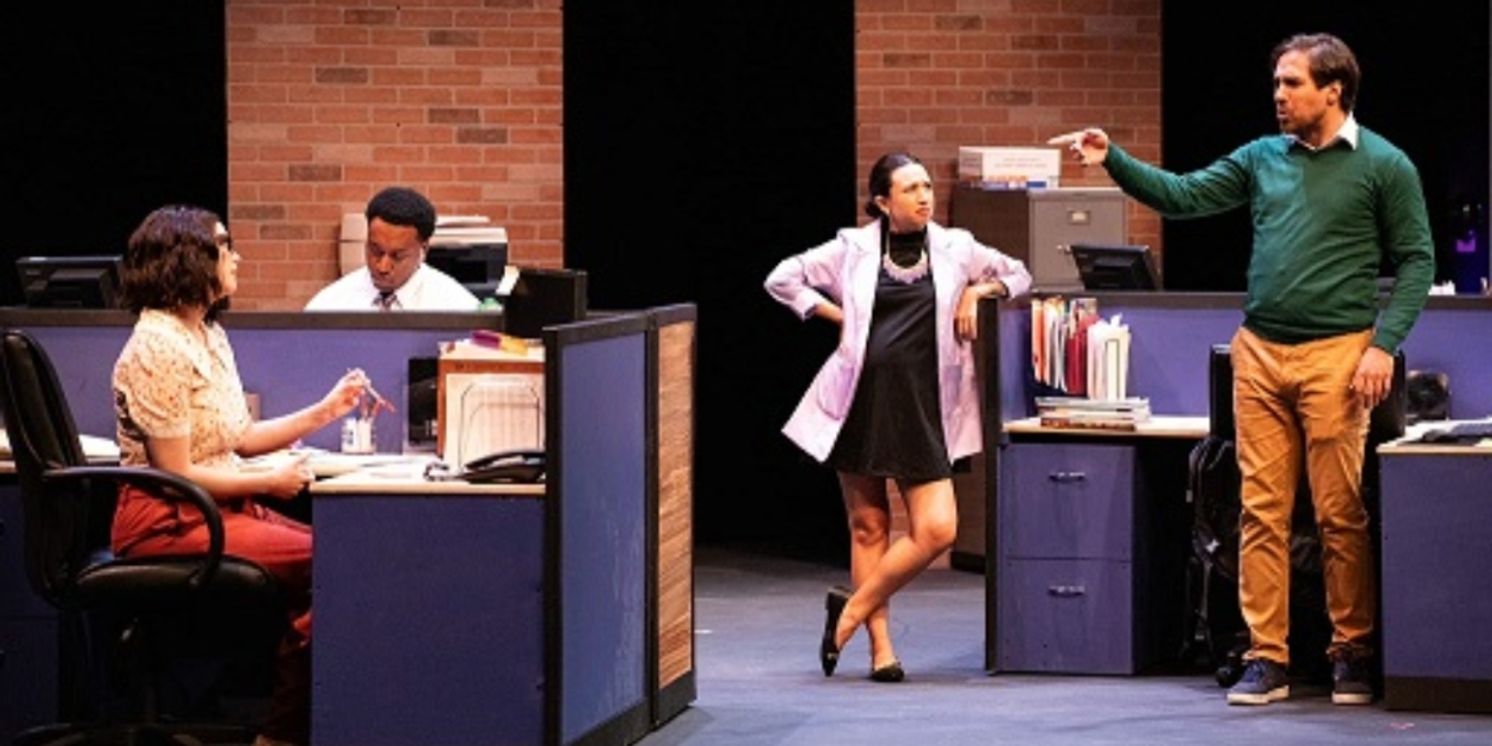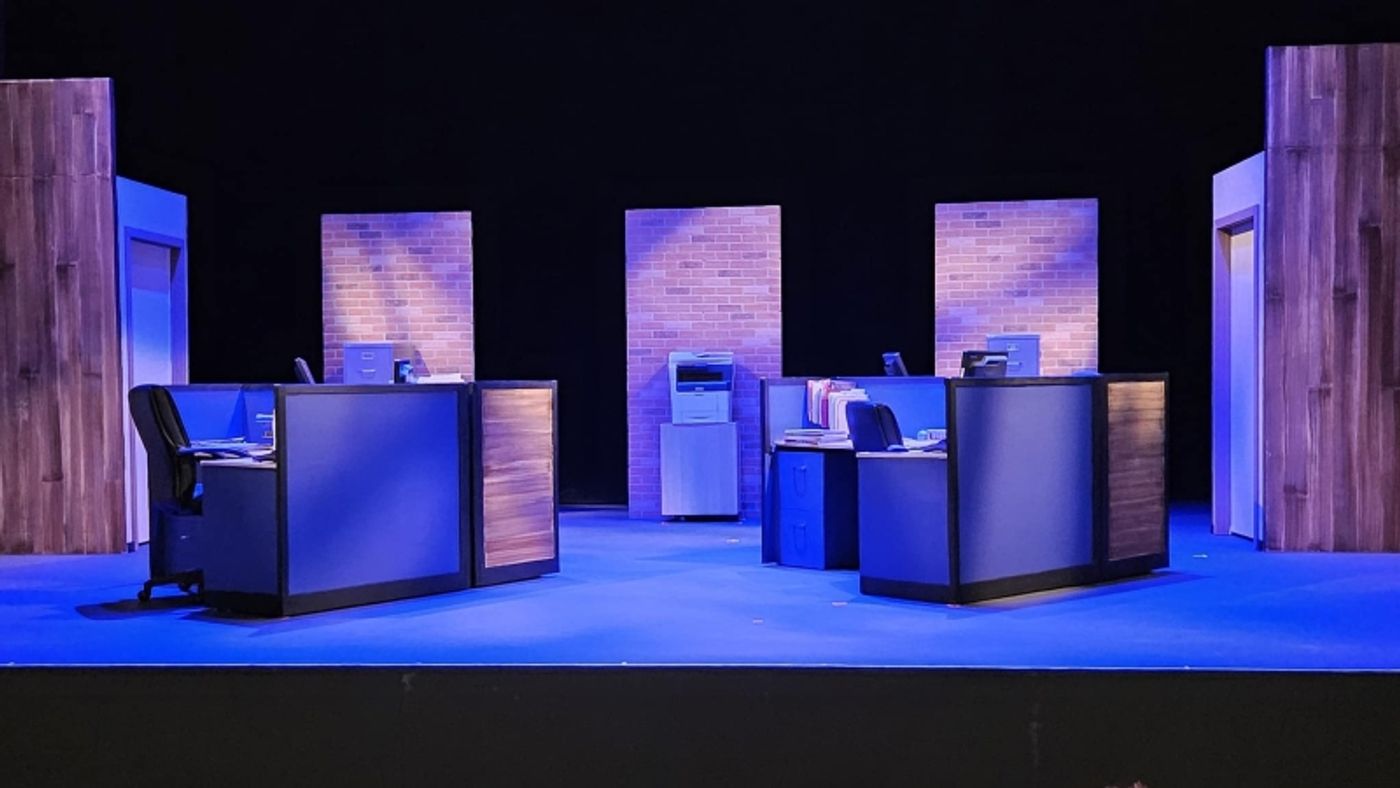Review: GLORIA At Stray Cat Theatre
The production runs through October 14th at Tempe Center for the Arts ~ Studio Theatre.

‘I have no spur to prick the sides of my intent but only vaulting ambition which o’erleaps itself and falls on th’other’~ Macbeth, Act I, scene 7
Much is rightly made of ambition as the noble pursuit of one’s dreams. Under certain circumstances, however, the drive for achievement can have unexpected and adverse consequences. As was the case with Macbeth, ambition yielded the potential of both clearing the obstacle of Duncan but also of being the Thane’s downfall.
Think now of ambition in the context of today’s high-tension corporate workplace. In fact, that is precisely what Branden Jacobs-Jenkins has done in his searing satiric drama, GLORIA. In doing so, with a mastery of writing and an acute sense of irony, he reveals how that Macbethian paradox plays itself out and where the chase for success may take a human toll. (Think back even to Budd Schulberg’s What Makes Sammy Run? For a classic example of the unabashed go-getter.)
Since his ascendance as a playwright of note a decade ago, Jacobs-Jenkins has been the object of critical acclaim for his incisive exploration of race, identity, mortality, and family dynamics (An Octoroon, Appropriate, Everybody).
With GLORIA (a finalist for the 2016 Pulitzer Prize for Drama ~ and mind you, initially subtitled OR AMBITION), his sharp pen (or keyboard) delivers us to what begins as a routine day in the offices of a Manhattan magazine publishing company.
Under the astute and inspired direction of Dolores E. Mendoza, GLORIA (Stray Cat Theatre’s 22nd Season opener) the lines and action of the play are transformed into a jarring high-voltage theatrical experience.
Settled (perhaps, it’s more accurate to say, unsettled) in their cubicled work stations is a group of aspiring young (twenty-something) writers, each with a dream of making it big in the publishing world.
David Castellano has arranged the stage to reflect not only the physical but also the emotional distances between these players. To that end, their stations, like small gulags of self-absorption, are distanced feet apart. It’s a smart design that is accentuated by Stacey Walston’s cold atmospheric lighting.

Within the bare walls of this austere platform, director Mendoza has orchestrated the dance of the characters’ egos and shaped what is, in every sense, a dark, biting, and satirical tale about costs of ambition. The so-called “cutthroat world” of publishing is merely the cauldron in which this soup is mixed.
And the soup, as it were, is tart and spicy, with Mendoza’s ensemble cast delivering the goods in portraying the distinctive personas, motivations, and emotions of their assigned roles. (In the course of the play, all but one of the actors play multiple parts with impressive effect.)
Despite the spaces that separate them, opportunities remain for annoying intrusions, marked by barbs and sarcasm.
The star of chatterboxing is Kendra (Willa Eigo, charismatic but voicing her lines at warp speed and at such high pitch that they’re nearly indiscernible). She works (or does she, really?) more at bloviating about her self-image and fashion preferences to the annoyance of Dean (Johnny Kalita), a more serious and focused worker whose earbuds can’t protect him from Kendra’s verbal barrage.
Sabrina Harding shares the stage as Ani, an equally aspiring co-worker. As the play progresses, Harding excels at adding dimension and nuance to her performance.
Every office needs an intern, and Everett Purvall fills the bill as Miles, the representation of an even younger generation entering the workforce, eager to learn and as yet unscathed by the toxicity and dysfunction of office life.
The noise from the cubicles draws Lorin (Jonathan Hernandez), an overworked and stressed-out fact checker from another department, to plead for silence. In the midst of the cacophony of egos, Hernandez, by play’s end, is the ultimate representation of the survivor, who, for all his dissatisfaction and passive-aggressive behavior, gets how the system works.
Megan Holcomb’s portrayal of the titular character of the play, is stunning for its effective understatement of an enigmatic and somewhat reclusive co-worker. Gloria drifts in and out of view, seemingly despondent and forlorn, hesitant to engage with her co-workers. She has been with the company the longest and, in an effort to engage with the younger employees, held a housewarming party the night before to which only one person, Dean, attended. The hurt is palpable. The question looms as to how a quiet soul deals with a sense of isolation and rejection.
(Holcomb, revealing her range as an actress, returns to the stage in a later act as Nan, the magazine's editor-in-chief, with an agenda that will have a dramatic impact on her subordinates.)
Johnny Kalita delivers a standout, compelling, and intensely relatable performance as Dean, one of the magazine's editorial assistants, whose ambition to be taken seriously as a writer and whose opportunity to do so becomes thwarted in a devilish twist of someone else’s ambition.
So it goes. After a jarring and violent incident that brings the first act to a head, the play skips forward two years to an encounter between those who recall that day. And the story verges into the realm of authorship. That is, who gets to be the authentic story teller? Who is entitled to tell the true story about the day in a life of? The playwright is channeling a message not only about ambition and how corporate cultures feed it but also about how art becomes monetized and commercialized in an economic environment that marginalizes authenticity and promotes celebrity. Just one of several layers in a remarkable play.
Indeed, GLORIA may be regarded and valued as a startling metaphor for the narcissism that typifies too many corners of modern American society.
For all the trauma and angst that GLORIA depicts, Jacobs-Jenkins offers no resolution…and that’s okay. That’s the way life is…unresolved. And that’s the glory of great theatre…that it prompts reflection and mindfulness…and maybe even action.
Bottom line: GLORIA is a premier offering in a theatre Season that is all too often filled with retreads and chestnuts. Leave it to Stray Cat Theatre, under Ron May’s leadership, to deliver powerful, resonant, and emotionally charged theatrical experiences. The play runs through October 14th and merits your attendance.
Stray Cat Theatre ~ http://straycattheatre.org ~ 480-350-2822 ~ Tempe Center for the Arts ~ Studio Theatre ~ 700 W. Rio Salado Parkway, Tempe, AZ
Photo credit to by John Groseclose; L to R Sabrina Harding, Everett Pervall, Willa Eigo, and Johnny Kalita
Reader Reviews

Videos

